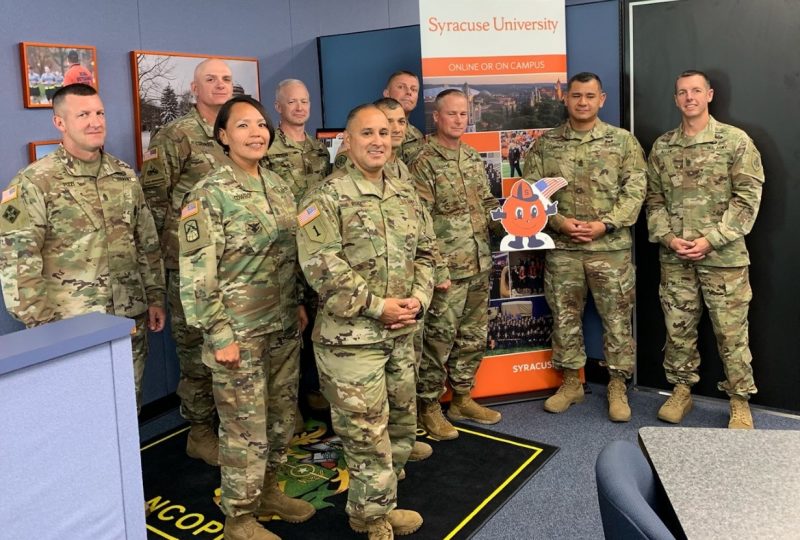 As thousands of students began classes at Syracuse University this week, 10 sergeants majors stationed at the academy at Fort Bliss, Texas, also joined the Orange Family. They are part of the U.S. Army Sergeants Major Academy Fellowship Program, and through a partnership with Syracuse University, the fellows will complete master’s degrees in instructional design, development and evaluation (IDD&E), offered fully online through the School of Education. The fellows, who are assigned to Fort Bliss for three years, will finish their degrees within a year and go on to design and instruct the academy’s Sergeants Major Course, which educates the military’s enlisted personnel to operate on all levels of leadership.
As thousands of students began classes at Syracuse University this week, 10 sergeants majors stationed at the academy at Fort Bliss, Texas, also joined the Orange Family. They are part of the U.S. Army Sergeants Major Academy Fellowship Program, and through a partnership with Syracuse University, the fellows will complete master’s degrees in instructional design, development and evaluation (IDD&E), offered fully online through the School of Education. The fellows, who are assigned to Fort Bliss for three years, will finish their degrees within a year and go on to design and instruct the academy’s Sergeants Major Course, which educates the military’s enlisted personnel to operate on all levels of leadership.
For this inaugural cohort, the fellows were welcomed to Syracuse University when seven members of the University’s senior leadership, faculty and staff visited Fort Bliss for a program orientation in the middle of August. In the future, the fellows may have opportunities to visit the Syracuse University campus. Syracuse was selected as an educational partner for the Fellowship Program not only because of the high quality of the IDD&E master’s program but also because of support from SU’s Institute for Veterans and Military Families, the Office of Veteran and Military Affairs, and the Center for Online and Digital Learning at the College of Professional Studies.
“We are very pleased with our partnership with USASMA and excited to see a fully online MS in IDDE program,” says Joanna Masingila, dean of the School of Education. “Our collaboration with University College and CODL is very important to us, and we see a great potential for growth for School of Education courses and programs that serve both military personnel and civilians in an online format.”
The online master’s degree in instructional design, development and evaluation consists of 30 graduate credits with the goal of developing expertise to design, create, implement and evaluate non-technology and technology-supported instructional solutions for a variety of educational and professional settings. Students participate in coursework areas such as principles of instruction and learning, techniques in educational evaluation, technologies for instructional settings, and strategies in educational project management.
“During orientation, several fellows asked about the use of these competencies after their military career,” says Tiffany A. Koszalka, professor of instructional design, development and evaluation in the School of Education. “We shared examples of where our alumni have secured positions all around the world. Some fellows suggested that they will continue with their military career and this will be helpful to them. Some suggested they will retire from the military and move into civilian instructional design careers.”
“The decision to build and support the M.S. in IDD&E program with University College demonstrates the University’s commitment to leveraging our deep capabilities in course design and production, proven experience marketing online programs, and feature-rich platforms and infrastructure,” says Michael Frasciello, dean of University College. “The level of support, quality production of rigorous courses, faculty engagement and student success we are achieving are now institutional benchmarks for developing and producing future Syracuse University online programs.”
“The online version of the M.S. IDD&E is the same high-quality program with the same instructional goals and expected learning outcomes as our long-running campus-based M.S. IDD&E program,” Koszalka says. “Several activities and resources were digitized for access by a distributed audiences and new communication channels, both asynchronous and synchronous, were added to provide communication with peers and the instruction. Each course (both online and campus-based) contains ample opportunities for interactions between learners and content, learners and peers, and learners and instruction.”
The online program has also enrolled non-military students into the inaugural cohort, Koszalka says. The numbers of distance learners are expected to grow over the next few years as Fort Bliss has projected 15 students for next year, and IDD&E has been seeing an uptick in inquiries for the new master’s program as well as the department’s certificate of advanced study in designing digital instruction.
“We are very pleased with our partnership with USASMA and excited to see a fully online MS in IDDE program,” says Joanna Masingila, dean of the School of Education. “Our collaboration with University College and CODL is very important to us, and we see a great potential for growth for School of Education courses and programs that serve both military personnel and civilians in an online format.”
